

Immanuel Kant. Immanuel Kant (/kænt/;[1] German: [ɪˈmaːnu̯eːl kant]; 22 April 1724 – 12 February 1804) was a German philosopher who is widely considered to be a central figure of modern philosophy.
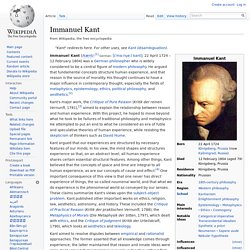
He argued that fundamental concepts structure human experience, and that reason is the source of morality. His thought continues to have a major influence in contemporary thought, especially the fields of metaphysics, epistemology, ethics, political philosophy, and aesthetics.[2] Kant's major work, the Critique of Pure Reason (Kritik der reinen Vernunft, 1781),[3] aimed to explain the relationship between reason and human experience. With this project, he hoped to move beyond what he took to be failures of traditional philosophy and metaphysics. He attempted to put an end to what he considered an era of futile and speculative theories of human experience, while resisting the skepticism of thinkers such as David Hume. Kant argued that our experiences are structured by necessary features of our minds. [edit] Johann Gottlieb Fichte. Johann Gottlieb Fichte (German: [ˈjoːhan ˈɡɔtliːp ˈfɪçtə]; May 19, 1762 – January 27, 1814) was a German philosopher.
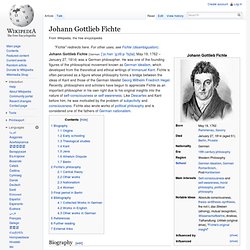
He was one of the founding figures of the philosophical movement known as German idealism, which developed from the theoretical and ethical writings of Immanuel Kant. Fichte is often perceived as a figure whose philosophy forms a bridge between the ideas of Kant and those of the German Idealist Georg Wilhelm Friedrich Hegel. Recently, philosophers and scholars have begun to appreciate Fichte as an important philosopher in his own right due to his original insights into the nature of self-consciousness or self-awareness. Like Descartes and Kant before him, he was motivated by the problem of subjectivity and consciousness. German idealism. German idealism was a speculative philosophical movement that emerged in Germany in the late 18th and early 19th centuries.
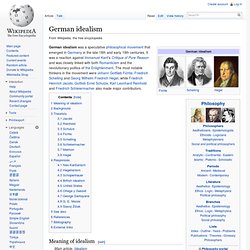
It was a reaction against Immanuel Kant's Critique of Pure Reason and was closely linked with both Romanticism and the revolutionary politics of the Enlightenment. The most notable thinkers in the movement were Johann Gottlieb Fichte, Friedrich Schelling and Georg Wilhelm Friedrich Hegel, while Friedrich Heinrich Jacobi, Gottlob Ernst Schulze, Karl Leonhard Reinhold and Friedrich Schleiermacher also made major contributors. Meaning of idealism[edit] The word "idealism" has more than one meaning. The philosophical meaning of idealism here is that the properties we discover in objects depend on the way that those objects appear to us as perceiving subjects, and not something they possess "in themselves", apart from our experience of them.
Background[edit] Kant had criticized pure reason. Theorists[edit] Friedrich Heinrich Jacobi. Friedrich Heinrich Jacobi (25 January 1743 – 10 March 1819) was an influential German philosopher, literary figure, socialite, and the younger brother of poet Johann Georg Jacobi.
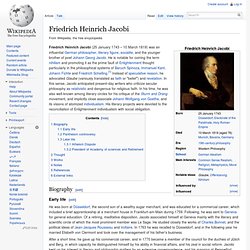
He is notable for coining the term nihilism and promoting it as the prime fault of Enlightenment thought particularly in the philosophical systems of Baruch Spinoza, Immanuel Kant, Johann Fichte and Friedrich Schelling.[1] Instead of speculative reason, he advocated Glaube (variously translated as faith or "belief") and revelation. In this sense, Jacobi anticipated present-day writers who criticize secular philosophy as relativistic and dangerous for religious faith.
In his time, he was also well-known among literary circles for his critique of the Sturm and Drang movement, and implicitly close associate Johann Wolfgang von Goethe, and its visions of atomized individualism. Nihilism. Nihilism is also a characteristic that has been ascribed to time periods: for example, Jean Baudrillard and others have called postmodernity a nihilistic epoch,[4] and some Christian theologians and figures of religious authority have asserted that postmodernity[5] and many aspects of modernity[3] represent a rejection of theism, and that such rejection of their theistic doctrine entails nihilism.
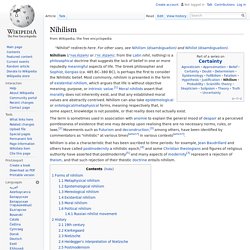
Forms of nihilism[edit] Nihilism has many definitions, and thus can describe philosophical positions that are arguably independent. Fathers and Sons. Father and Son or Fathers and Sons may refer to: In literature[edit] In music[edit] Onscreen[edit] In film[edit] (Chronological) In television[edit] Other[edit] See also[edit]
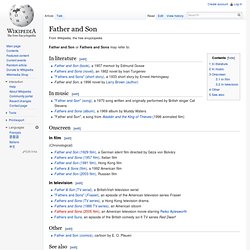
Friedrich Wilhelm Joseph Schelling.
Thomas Carlyle.